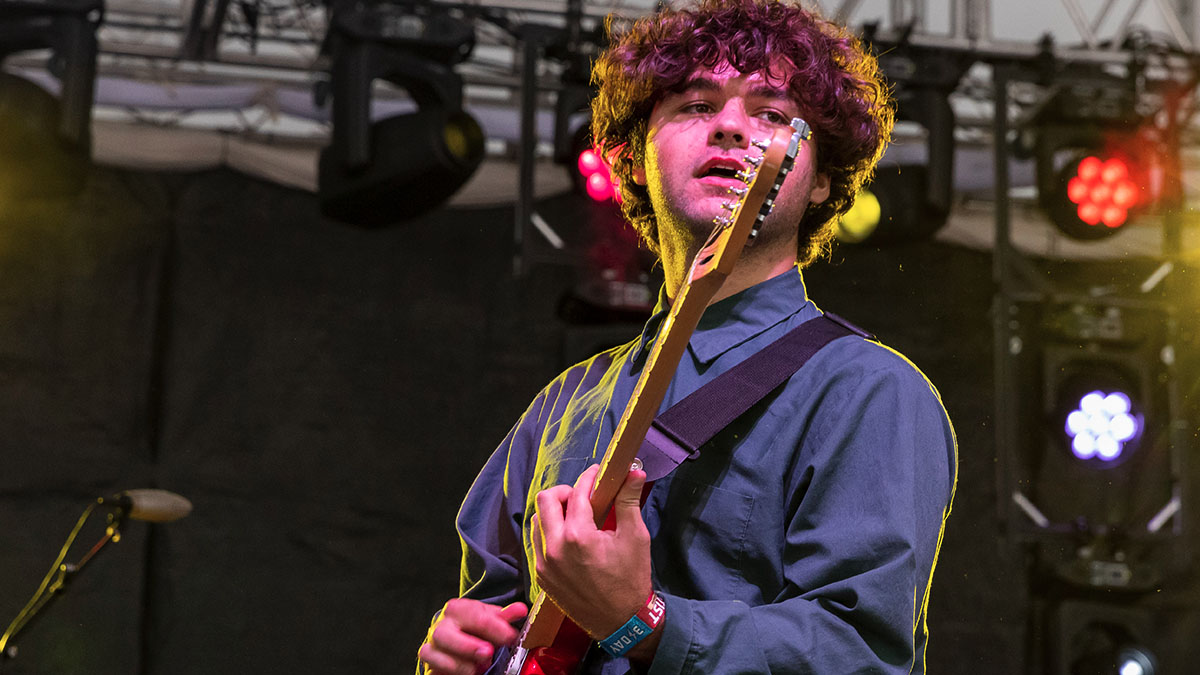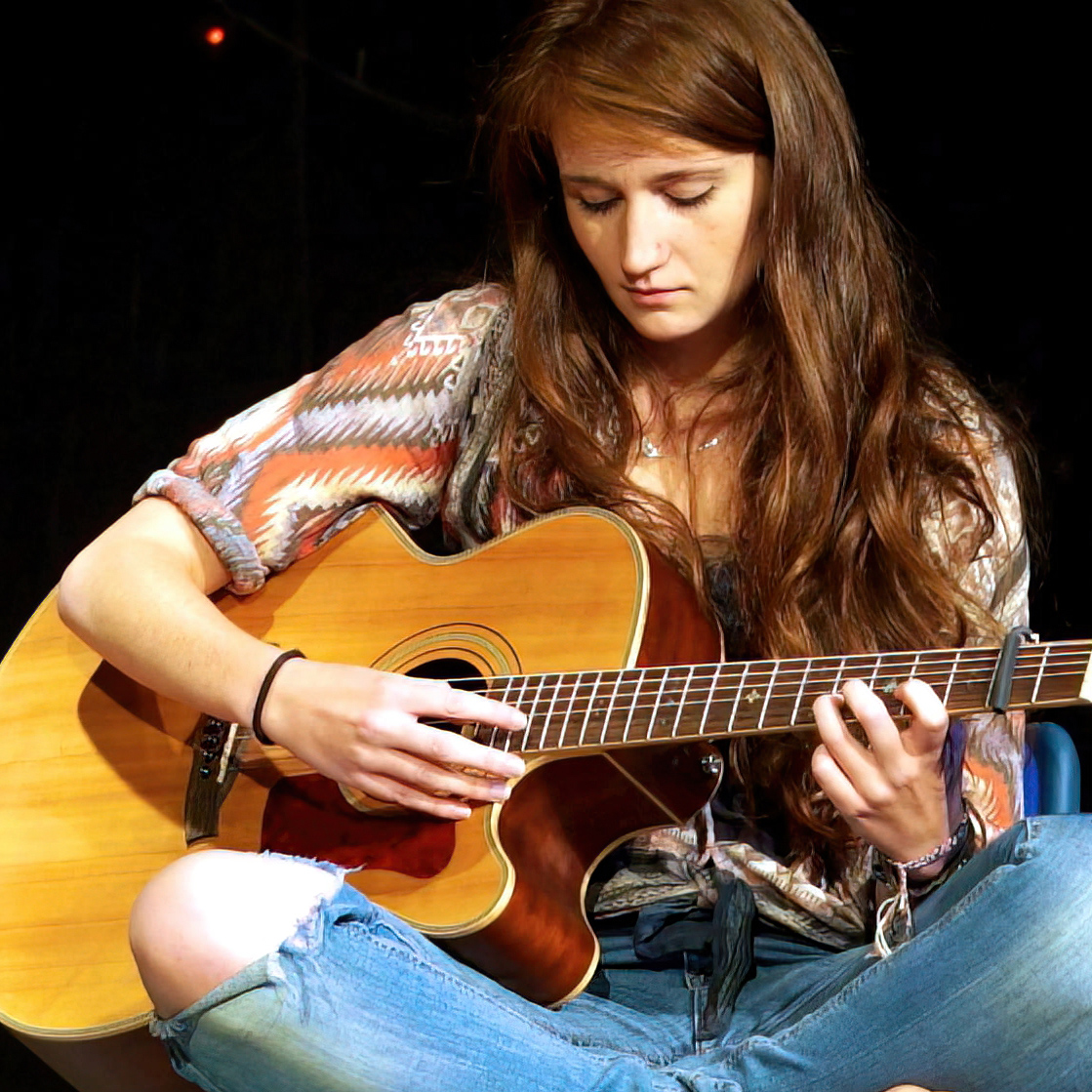“There was a time when I didn’t want to make punk music because my dad makes that type of stuff”: Meet Jakob Armstrong, the Jazzmaster-toting son of Green Day’s Billie Joe who’s blazing his own trail with Ultra Q
The son of a punk megastar, Jakob Armstrong was born to play guitar. But that doesn't mean he has to play punk. In Ultra Q, the influences span The Cure to dance. Maybe they'll do metal next...

When your dad is one of the most influential figures in punk rock history, it’s unlikely that you’re going to grow up aspiring to hold down a normal nine-to-five. But, for Jakob Armstrong – youngest son of Green Day’s Billie Joe – the moment of realisation that he was destined to follow the family trade didn’t arrive until he’d already sampled a more conventional path.
“I don’t think I knew that making music was my vocation until, honestly, I was 18 or 19,” says the now 24-year-old Jakob. “I had already graduated high school and I’d been playing with the guys in my band for a long time. I tried going to college, but after about a year I realised that I did not enjoy it. I missed playing music so much.”
Fronted by Armstrong, the principal songwriter and rhythm guitarist, Ultra Q also features brothers Enzo and Chris Malaspina, who handle lead guitar and drums respectively, and bassist Kevin Judd. They’re a tight-knit bunch with a chemistry that traces all the way back to when Armstrong and the Malaspina brothers met as five- or six-year-old playmates.
Around the same time, Green Day were at the height of their second wave of popularity and Jakob had already begun subconsciously “soaking in all of this stuff,” although he describes a childhood surrounded by rock stars as being “just normal” to him at the time. “Looking back on it, I can see that it’s absolutely a large part of the reason I wanted to play guitar and be in a band,” he reflects.
In their teens, Jakob and the Malaspinas began releasing music under the name of Mt. Eddy, with Judd joining the brotherhood later in high school. The brief dalliance with further education only served to crystallise their ambitions. “When we decided to come back together,” Jakob recalls, “that’s when we were like, okay, we’re Ultra Q. We’re a band and we want to do this as a career.”
At the time of this interview, Total Guitar finds the whole band hanging out together, right before the first night of their US tour with indie stalwarts Cloud Nothings and Wavves. It’s also the eve of their debut album release, so spirits are understandably high – although the launch of this album, My Guardian Angel, actually marks the end of their deal with Royal Mountain Records.
“We’re kind of just going to roll the dice this summer, see what happens and see where we end up,” smiles Jakob, while his bandmates shrug and nod in agreement. “We’re trying to tour and play shows,” he adds. “That’s where our band really thrives. It’s honestly also where we have the most fun.”
Get The Pick Newsletter
All the latest guitar news, interviews, lessons, reviews, deals and more, direct to your inbox!
The Ultra Q story so far is long and winding with lots of failures. We’ve failed many times as a band so far
Equipped with a passenger van, enough talent to fill it 10 times over and such an enthusiasm for gigging that they’ve already lost count of how many laps they’ve taken around the US, Ultra Q relish playing everything from opening spots to headline shows in their home state of California – and it certainly doesn’t appear that the elder Armstrong has ever weighed in to expedite the journey from the grassroots up.
“The Ultra Q story so far is long and winding with lots of failures,” laughs Jakob. “We’ve failed many times as a band so far, and we’re probably going to continue to fail, but it’s about the fact we all love to do it so much that we’re going to make it work no matter what.”
Beyond their youthful zeal, much of the Ultra Q appeal lies in the fact that their sound is ever-shifting in line with fluctuating listening tastes.
“We’ve done three EPs before this record and the first one is very Strokes-inspired with all the angular guitar stuff,” explains Jakob. “The second one is pretty much a hardcore EP – very Minor Threat, very Circle Jerks – because that’s what we were into when we made it.
“I think that’s something that we lean into as a band. We’re good at making whatever we’re into right now. There’s no rules as far as that stuff goes and, who knows, maybe the next album will be a metal album.”
As for My Guardian Angel, which was recorded when the band were filling their ears with, in Jakob’s words, “synths and dance music, DnB breakbeats and all sorts of shoegaze and dream pop,” there’s a delirious haze of textures, a mesh of intertwining synth and guitar parts and a collision of upbeat and downbeat forces – as if LCD Soundsystem and The Cure (Jakob’s “favourite band of all time”) had spawned an illicit musical lovechild.
There was a time when I didn’t want to make punk music because my dad makes that type of stuff, but honestly, I don’t really care anymore
But it’s worth mentioning that, while picking and mixing from a candy store of influences, Jakob never tries to sound like his father nor mask any inherent sonic similarities.
“It’s DNA, I guess,” he shrugs. “There was a time when I didn’t want to make punk music because my dad makes that type of stuff, but honestly, I don’t really care anymore. I’m doing what interests me and what’s going to keep me wanting to be in a band. There are absolutely going to be tracks that remind people of that, but it is what it is.”
Despite being a guitarist first and foremost, Jakob also refrained from setting any limitations when it came to instrumentation: “If there was something and it was a synth part, that’s what it was. We didn’t try to make it a guitar part, but blending them together was really the goal.”
Assisted by producer Chris Coady, they bridged the gap between jagged riffs and smooth synths with extra textural layers and tonal experiments. As Jakob says: “Chris was using these pedals to go direct – not using amps for some things – and it was really cool to watch him work because I think he noticed that we’re not just a straight-ahead guitar band. What he successfully did was find a way to mesh those things really well side by side.”
Ever since, the challenge has been to transport studio-born tones to the stage. “Even within the last couple of months, Enzo has turned his pedalboard into a kind of spaceship,” laughs Jakob, who’s yet to be bitten quite as badly by the gear-buying bug, and depends on a Strymon Deco Tape Saturation and an Empress ZOIA modular synth pedal as the basis of his sound.
“I have the tape saturation on for the entire show and I use it almost as a master,” he says. “Then I use the ZOIA – and I’m not even scratching the surface of what it can really do – for all my different distortion tones. I run that through the Deco with the tape saturation on, and that kind of glues everything together because some of the tones vary a lot.”
At the heart of the operation is also a Mexican Fender Jazzmaster that Jakob has owned since he was 16, and which he plays in homage to The Cure’s Robert Smith circa 1980.
“It’s the coolest thing and it’s never done me wrong,” he smiles, explaining that everything goes through a Fender Super-Sonic combo amp that offers the perfect amount of punch for the “small rooms” the band currently frequents – with the added bonus being that its compact size makes for easy van loading.
“I like to have it be as simple as possible and use as little stuff as possible,” he says, although he does confess to lusting after “one of those walls of Marshalls” for future outings.
“I don’t know if it would work with the music we play,” he says, “but it would be a dream.” And – who knows – perhaps the opportunity will arise if album two does take that heavy metal turn.
- My Guardian Angel is out now via Royal Mountain.
Since graduating university with a degree in English, Ellie has spent the last decade working in a variety of media, marketing and live events roles. As well as being a regular contributor to GuitarWorld.com, she currently heads up the marketing team of a mid-scale venue in the south-west of England. She started dabbling with guitars around the age of seven and has been borderline obsessed ever since. She has a particular fascination with alternate tunings, is forever hunting for the perfect slide for the smaller-handed guitarist, and derives a sadistic pleasure from bothering her drummer mates with a preference for wonky time signatures.
“It holds its own purely as a playable guitar. It’s really cool for the traveling musician – you can bring it on a flight and it fits beneath the seat”: Why Steve Stevens put his name to a foldable guitar
“Finely tuned instruments with effortless playability and one of the best vibratos there is”: PRS Standard 24 Satin and S2 Standard 24 Satin review

![A black-and-white action shot of Sergeant Thunderhoof perform live: [from left] Mark Sayer, Dan Flitcroft, Jim Camp and Josh Gallop](https://cdn.mos.cms.futurecdn.net/am3UhJbsxAE239XRRZ8zC8.jpg)









